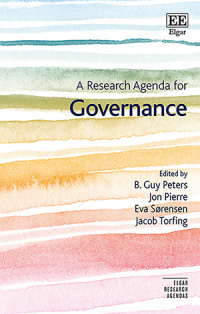Hardback
A Research Agenda for Governance
This incisive Research Agenda for Governance draws together unique contributions from leading scholars to examine the two distinct models of governance: the traditional model, based on the state and exercise of control through law and bureaucracy, and an alternative model centred on the collaboration of public and private sector actors.
More Information
Critical Acclaim
Contents
More Information
Elgar Research Agendas outline the future of research in a given area. Leading scholars are given the space to explore their subject in provocative ways, and map out the potential directions of travel. They are relevant but also visionary.
This incisive Research Agenda for Governance draws together unique contributions from leading scholars to examine the two distinct models of governance: the traditional model, based on the state and exercise of control through law and bureaucracy, and an alternative model centred on the collaboration of public and private sector actors.
Introducing the essential principles and rationale of these alternative models of governance, both of which can be seen operating at all levels of government in democratic as well as non-democratic regimes, the chapters evaluate the strengths and weaknesses of the two systems. Drawing conclusions from critical areas of inquiry, including multi-level governance, the nature of governance in democratic and authoritarian regimes, and digital innovations in governance, the book offers a richly detailed insight into the respective workings of the models of governing by control and by collaboration.
This Research Agenda will be an invaluable resource for academics and graduate students of public policy, regulation and governance, and public administration management. Its measured consideration of the possibilities for enhancing public innovation via alternative models of governance will also be of significant interest to employees within the public sector.
This incisive Research Agenda for Governance draws together unique contributions from leading scholars to examine the two distinct models of governance: the traditional model, based on the state and exercise of control through law and bureaucracy, and an alternative model centred on the collaboration of public and private sector actors.
Introducing the essential principles and rationale of these alternative models of governance, both of which can be seen operating at all levels of government in democratic as well as non-democratic regimes, the chapters evaluate the strengths and weaknesses of the two systems. Drawing conclusions from critical areas of inquiry, including multi-level governance, the nature of governance in democratic and authoritarian regimes, and digital innovations in governance, the book offers a richly detailed insight into the respective workings of the models of governing by control and by collaboration.
This Research Agenda will be an invaluable resource for academics and graduate students of public policy, regulation and governance, and public administration management. Its measured consideration of the possibilities for enhancing public innovation via alternative models of governance will also be of significant interest to employees within the public sector.
Critical Acclaim
‘This is essential stuff for anyone interested in real processes of governance. If you want to understand how new forms of collaboration with citizens become intertwined with traditional modes of hierarchical governance – and in the challenges this poses for governance practices and governance research – this book is essential. It is also written in easily accessible language while simultaneously drawing on a very rich base of expert knowledge. A fascinating read!’
– Thomas Schillemans, Utrecht University, the Netherlands
– Thomas Schillemans, Utrecht University, the Netherlands
Contents
Contents: 1. Foundations for thinking about governance 2. State-centric governance 3. The rise of collaborative governance 4. Metagovernance 5. How does collaboration function in multilevel governance? 6. What is good governance and how good is it? 7. How collaborative governance can make political systems more democratic and effective 8. The promise, perils and pitfalls of digital governance 9. Is global governance possible? 10. Measuring governance 11. The quest for public innovation 12. Conclusion: the implications of control and collaboration in public governance Index




